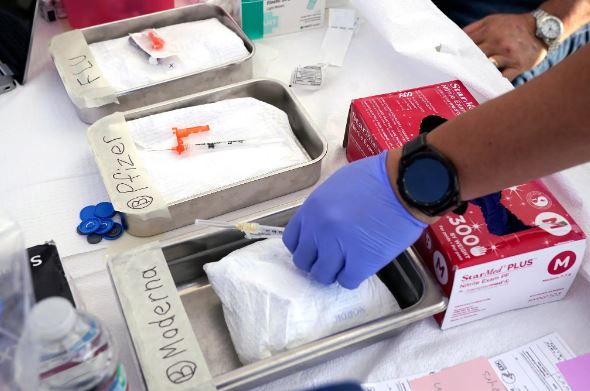In addition to the seasonal flu vaccination and injections to protect newborns and older people against R.S.V., a potentially dangerous respiratory virus, the Food and Drug Administration (FDA) authorised a fresh round of Covid boosters on Monday.
Pfizer-BioNTech and Moderna have developed new vaccines, and on Tuesday the CDC will hold an advisory meeting to decide who should get them. Within days of the director of the CDC making a final decision, millions of pills will be distributed to distribution centres around the country.
Covid cases are on the rise, but this might be the first winter in a decade when hospitals aren’t overwhelmed by the influx of patients. However, a virus-free winter is far from guaranteed; just 20% of American adults received the revised Covid vaccination in the previous year.
Due to an increasingly immune population and greater immunisation rates among older Americans, this data is not seen as particularly concerning by some experts. For others, this year represents a golden chance to save the lives of even more individuals who are particularly at risk.
The Food and Drug Administration has given its stamp of approval to the new formulations, allowing them to be used to safeguard babies aged 6 months and up to 11 years old. On August 31, the Pfizer injection was approved for use in the European Union for infants aged 6 months and up.
This week marks the beginning of widespread administration of the Covid vaccination in the United Kingdom, with the first doses being given to the elderly and those most at risk in residential care facilities.
Officials in the federal government have been shifting away from characterising the new formulation as boosters for prior doses and instead portraying it as an annual immunisation campaign similar to the flu vaccine. Some Americans may be becoming tired of getting injections to combat the virus, and this move may reflect that.
In addition, this vaccination drive will be the first since the closure of the public health emergency in May. The United States government spent hundreds of millions of dollars on vaccines and gave them out free of charge in prior years. Vaccines are likely to be provided free of charge this year by commercial insurance and government payers like Medicare, which cover the great majority of Americans.
It is unclear, however, whether private sector institutions like hospitals, clinics, and pharmacies would be able to adjust their vaccination orders accordingly. The desire for the newest doses has experts stumped.
The nation’s 23 million uninsured people are another cause for worry in the transition to the private market. The Covid vaccination will be made available at no cost by the Biden administration via community health centres and big pharmacies, but some experts are concerned that uninsured individuals won’t know about it or know where to acquire it.
The nation’s 23 million uninsured people are another cause for worry in the transition to the private market. The Covid vaccination will be made available at no cost by the Biden administration via community health centres and big pharmacies, but some experts are concerned that uninsured individuals won’t know about it or know where to acquire it.
People over the age of 65, as well as those with impaired immune systems or preexisting diseases that increase their risk of developing a severe infection, will be among the categories specifically targeted.
Nearly all residents of nursing homes were vaccinated during the first pandemic waves, but they have since fallen behind on booster rates. While older persons are more susceptible to serious sickness and death from the virus, recent Medicare statistics indicate that around 62% of residents are up-to-date on their immunisations.
When vaccine developers started working on a new version of the Covid vaccine, the XBB.1.5 variety was already the most common one. The original virus that caused widespread illnesses in China more than three years ago is not included in these boosters, making them monovalent. Experts claim the new Covid vaccine will strengthen defences against severe illness, despite the virus’s revolving door of varieties.
Associate professor of molecular microbiology and immunology at Oregon Health & Science University Fikadu Tafesse recently said that recent concerns that one newer, highly altered form may escape the vaccination were untrue by credible independent laboratories. On Friday, the CDC affirmed that, based on its own analysis of the available research, the vaccination continues to be effective.
A bivalent booster vaccination effective against both the original virus and the prevalent strain, BA.5, was licenced in August 2022 after the first vaccine’s efficacy declined in the face of emerging Omicron variants. Over a period of months, the percentage of persons hospitalised due to Covid dropped from 60% to 25% after the injection was administered.
Even while Pfizer and Moderna both claimed their vaccinations were very effective against the most recent circulating strains, only Moderna published any data at all on Thursday.
However, scientists remain divided on how well it will tolerate future variants. Results from research on animals or limited human subjects have been the most common kind of data submitted to the FDA for assessment.
Dr. Walid Gellad, a medication safety specialist from the University of Pittsburgh, said that federal regulators would need to weigh whether to suggest the injection to healthy young Americans.
Myocarditis, or inflammation of the heart muscle, has been reported at a greater incidence in young boys after vaccination; nonetheless, many of these individuals made full recoveries within a few months.

